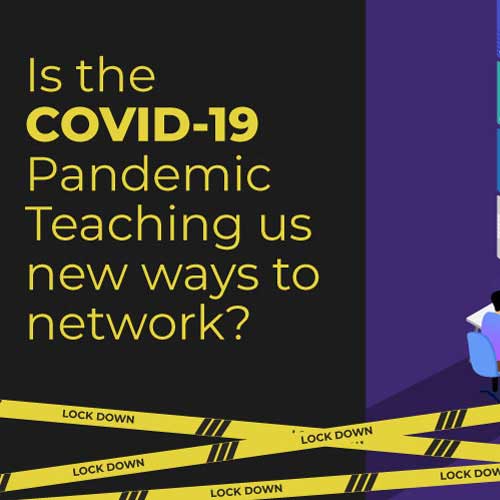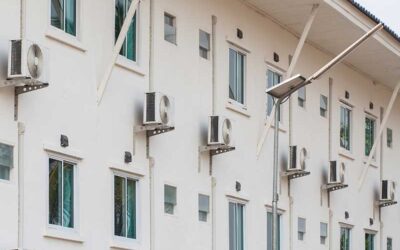Is the COVID-19 Pandemic Teaching us new ways to network?


There are events in history when disruptive changes become a new shared reality, forcing us to take a leap of faith into unchartered territory. The COVID-19 pandemic and its local, national and global health and safety regulations has changed the face of our people to people connections. As we vacate those hallways, we construct new networks, overcoming the physical with the virtual. In times like this adoption of innovation, technology and networked communications could be prescribed to keep the show going. But is India ready to adapt to this niche behaviour in the short term or do we still have miles to go and some hardships to overcome, even in a post COVID lockdown world?
Last month, as a major casualty of the escalating coronavirus crisis, the critical UNFCCC COP26 Climate Action global summit got postponed to 2021. The announcement was made in a joint statement from the UK and UN after a “virtual” meeting of officials with unprecedented global challenges in perspective. Summits and conclaves unless virtual could be tough to pull through in 2020. While, a lion’s share of trade shows, seminars, workshops and sporting events across the world, have either been cancelled or postponed, there is another emerging trend. Online Innovation Talks, masterclass, live streaming, registration enabled webinar, virtual firesides, podcasts and wired workshops enabling the modern networked, survivors!
India’s Teleconferencing preparedness is not a level playing field:
India is one of the largest and fastest-growing markets for digital consumers, with 560 million internet subscribers in 2018, second only to China. The public and private sectors are both propelling digital consumption growth. The government has enrolled more than 1.2 billion Indians in its biometric digital identity programme, Aadhaar, and brought more than 10 million businesses onto a common digital platform through a goods and services tax. (according to McKinsey Global Institute, March 2019, Digital India – Technology to Transform a Connected Nation) Digital consumption a necessary first step opens up the window for digital adoption. According to an IBEF e-commerce report 2017 projection the Indian e-commerce industry has been on an upward growth trajectory and is expected to surpass the US to become the second largest e-commerce market in the world by 2034, the Indian Banks, entertainment sector and several other industries are moving rapidly towards frictionless conversions.
However, en masse adoption among businesses has been uneven across all sectors divided often by geography, age and gender demography, access, and education & training. For example, in India, parts of the country, there is network capacity and bandwidth divide in rural and urban India and technological and infrastructural support is still evolving. Even before Covid-19 India lockdown that has been enforced since March 24, 2020 travel restrictions, and associated challenges had led us to explore video messages and online interaction from our biennial conference ENERGISE 2020: Energy Innovation for a Sustainable Economy, hosting site at Hyderabad from 11-13 February 2020, overcoming the physical distance barriers.
Lockdown has pushed India to work from home at least until May 3. Commercial and industrial establishments remain closed for business due to the pandemic, and households emerge as the primary consumers of electricity. In a first for India, domestic consumers, who have historically been the largest consumer by numbers, have also become the largest in terms of quanta. Summer is here, and the ambient temperature continues to increase in the sub-continent, opening a window to peek into the share of space cooling energy use in our homes. We have noted visible changes in the regional energy demand patterns, that gives us insight on how the residential consumers behave but it is too soon to gauge energy trends, and the short-term indicators are only offering clues on what needs to be prioritized.
Staying Flexible enables engagement
Flexibility enables access and it is unfortunate that it took a global health crisis to spotlight its significance. In-person events while incredible enablers, are often resource-heavy and under the current socio-economic constraints may not be the more viable option. Therefore, taking conferences, workshop and webinars online, connect more people with the right tools and platforms. In addition to reaching wider audiences, it is an opportunity to minimize emission of a conventional meeting in a hotel. It further reduces travel time and conflicting schedules, therefore increasing speaker participation, and disability access.
Early Adoption needs a remote first mindset
Work in the knowledge sector of energy efficiency and championing climate action, can be scaled with proper ICT (information, communications & technology) enabled channels. Early adoption of networking, communication & collaboration tools pay off. According to a latest report by Gartner, 54% of HR leaders have cited that poor technology and/or infrastructure for remote working is the biggest barrier to effective remote working. Whether in liberal work from home policies or building an enabling ecosystem for wired workshops, a fair amount of crisis preparedness would necessitate adoption of these new tools. Building an enabling IT infrastructure, computing equipment, printers at home, in addition to videoconferencing, messaging, collaboration software tools, with employee competency training, will keep productivity prioritized.
We are in this together. Adapting, upskilling, conjuring up workplaces that are time, space irreverent, and fulfilling our climate commitment while treading with caution and care. Because, we will meet again. “Touch has memory…” (says the poet John Keats), therefore irreplaceable.
The blog has been written by Ipshita Nandi Banerjee, Lead Strategic Communicator




